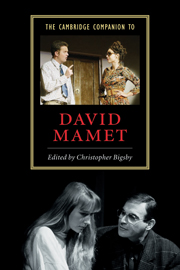Book contents
5 - Glengarry Glen Ross
Published online by Cambridge University Press: 28 May 2006
Summary
David Mamet spent part of 1969 in a Chicago real-estate office he has described as “a fly-by-night operation” trying to sell “worthless land to elderly people who couldn't afford it.” He would first apologize for telephoning them at home, then tell them that his company's “international president” was in town en route to New York. This gentleman wanted to meet some of the people who had requested a brochure describing “beautiful home-sites in scenic/historic Arizona/Florida” and so might be interested in investing in them: “Your views on the property would be used to help guide our development and they would, of course, be kept completely confidential.”
Mamet has also said that he was not very good at the job, because he could not help identifying with those he was phoning, but he clearly handed on a fair number of “leads” to salesmen who went to the homes of “prospects” for a “sit,” explaining that the president had been unexpectedly called away to Dallas, Houston, or Paris. Those men were actually selling uncharted sand or swamp but could, he has said, have sold cancer: “They were amazing. They were a force of nature . . . they were people who had spent their whole lives never working for a salary, dependent for their living on their wits, their ability to charm. They sold themselves.”
Not for the first or last time, he went on to draw on his memories for a play. Indeed, all that he set out to do in Glengarry Glen Ross, he has said, “was to write about my experiences in a real-estate office.” That sounds disingenuous, since his own comments on both the play’s content and its language make it clear that he wrote and meant to write something richer and more resonant than a documentary. Yet it helps explain one of the play’s strengths, which is the feeling of authenticity it unerringly transmits. Here is Arthur Miller’s Willy Loman at work in the 1980s: just as vulnerable but even more driven, even more compromised and distorted by the pressures of commerce and the harshness of American society.
- Type
- Chapter
- Information
- The Cambridge Companion to David Mamet , pp. 89 - 102Publisher: Cambridge University PressPrint publication year: 2004
- 3
- Cited by

